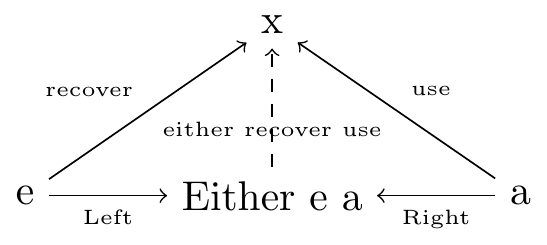Traces with monoidal errors
Haskell has a lot to offer when it comes to cleaning up your code structure. One of the gains is proper error signaling. Let us look at common C code returning NULL to signal errors and setting a global error variable:
void \*foo(...) {
do_something();
if (error) {
errno = 42;
return NULL;
} else {
return result;
}
}
You will find this for example in the standard function fopen. Additionally a global variable errno is set, to signal which kind of error was encountered. While this is very straight forward it has two problems:
- You are not warned if you use the result without checking for an error
- The global variable
errnowill be overwritten on every call
Now most modern languages solve this by adding Exceptions as a controlflow escape mechanism. They are as common place as shun upon, since they can cause great headaches in compiler construction, reasoning about code, multithreading, maintainability and cleanup.
A lot has been done in the Haskell world to study the subject. One of the most common approaches in real world libraries is to use MonadError with (Error e) => Either e a. We all know, that this is most convenient, especially because of the do-notation to chain computations which can fail:
foo :: Either String Result
foo = do
x <- bar
y <- baz x
return y
Either also is the Haskell name for coproducts, 
which means
recover = either recover use . Left
use = either reover use . Right
Where either is the unique function
either f _ (Left x) = f x
either _ g (Right y) = g y
and equality is up to Haskell’s reduction and alpha renaming. If an initial neutral element exists, coproducts can be turned into monoids. This element exists for the typeclass Error because of noMsg : (Error e) => e.
instance (Error e) => Monoid (Either e a) where
mempty = Left noMsg
(Left _) `mappend` x = x
res@(Right _) `mappend` _ = res
Combined with the monadic properties, this can as well be expressed as a MonadPlus instance. It is well known, that this interface allows elegant backtracking
backtrack :: (Error e) => [Either e a] -> Either e a
backtrack = foldl1 mappend
backtrack returns the first computation that did not fail. However the amiable reader might have noticed that the second problem mentioned above is not solved:
(Left err1) `mappend` (Left err2)
will drop err1 and only return err2. Luckily there is an easy improvement on the Monoid (or MonadPlus) instance of Either . What is really missing is a way to combine multiple errors and preserve the monoid properties. The easiest way to obtain the missing piece is to add a monoid requirement on the error type argument:
instance (Error e, Monoid e) => Monoid (Either e a) where
mempty = Left mempty
(Left e1) `mappend` (Left e2) = Left (e1 `mappend` e2)
(Left e1) `mappend` res@(Right _) = res
res@(Right _) `mappend` _ = res
Even though this approach is most simplistic, it just works :). Error types for which no combination is available can easily resort to the standard behavior:
instance Monoid StandardError where
mempty = Left noMsg
err `mappend` _ = err
A full blown instance declaration (including a monad transformer to stack the new error mechanism) can be found here. Let me know, if you need anything else (more instances, an upload to hackage, …).